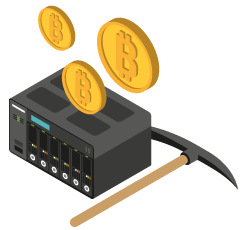
Aren’t all cryptocurrencies the same? Only with different names, volumes, and traded values? It’s tempting to believe that Bitcoin is just like all the rest. With the exception that it’s older and has a better reputation.
In reality, cryptocurrencies tend to be very different from one another for more than one reason. These reasons often dictate how valuable a cryptocurrency will become. Check out some of the key differences as well as some of the similarities for a better understanding of why Bitcoin occupies a special place in the world of crypto.
First of Its Kind – Brief Bitcoin History

There’s a very good reason that Bitcoin is still the most discussed and most valuable cryptocurrency. It’s the first of its kind.
In January of 2009, Bitcoin was launched by anonymous creator Satoshi Nakamoto. The concept involved the offering of a virtual currency, without physical representation and not tied to any central authority.
Hence the term of a decentralized currency. Unlike fiat currency that has physical representation, Bitcoin offered a secure, yet public ledger that holds a record of all past transactions. While in theory Bitcoin wasn’t the first attempt at launching a cryptocurrency, it was the first to do so with success.
Over the years, it garnered acceptance from governments, regulators, investors, and merchants. Now it coexists with the traditional financial system. Even though it is the subject of much debate and scrutiny, for various reasons.
Accessibility

You may not know this yet, but not all exchanges have a large offering of crypto coins. Bitcoin reigns supreme on most platforms. There are even crypto exchanges dedicated to trading Bitcoins.
There are also Bitcoin wallets that don’t even touch other cryptocurrencies. Some because they view it as the only proven technology. Others because the market value gap is too great to bother with alt coins.
There’s also an argument for Bitcoin transactions getting slower and slower. Therefore, some exchanges and wallets prefer not to burden the network with trades of other cryptocurrencies.
This helps to keep Bitcoin traders happy too. And it allows some investors and speculators to make faster profits by quickly acting on market bids and asks.
Merchants also favour Bitcoin due to its track record. It’s harder to buy a cup of coffee with Ethereum, XRP, or Litecoin, for instance. It’s even harder to buy a house or a car using anything other than Bitcoin.
The level of trust established by the first cryptocurrency gives it a massive edge over the competition.
Not All Cryptocurrencies Occupy the Same Niche

Another thing has to do with technology and usefulness. Consider Ripple’s XRP for a moment. When initially developed, this alt coin had a very specific purpose.
It was designed to facilitate large financial transfers in a more secure and rapid way. Between institutions, corporations, and even banks. Similar to XRP is Dogecoin, a cryptocurrency that has since fallen out of favour.
But, its role was similar in that it was intended for transferring value. A secondary role was tipping for various services.
So why didn’t it enjoy the same amount of success? Because Bitcoin could do the exact same thing already. Sure, there were some tax fees involved. However, users had to choose between a proven technology and something new and investing in the new kid on the block wasn’t as appealing.
The Dread of Extra Features

Most cryptocurrencies are modelled more or less after Bitcoin. The core principles tend to stay the same. Yet, some additional perks or technologies are often added.
This is the reason some people rush to invest in what’s new on the market. Unfortunately, it’s also the reason some investors chose to stay away from new alt coins.
The reasoning is simple. There’s nothing game-changing yet that would render Bitcoin obsolete. Additional features are nice, but who knows if they’re absolutely necessary?
After all, there’s nothing that XRP, Ethereum, Dogecoin, and others can do that can’t be implemented into Bitcoin as well. Since not all new perks become household features in the Bitcoin blockchain, it begs the question: Are they worth it?
A great example of this is using cryptocurrencies for tipping. You can do that with Bitcoin. You could always do that. So, what’s the point of investing in an alt coin that’s designed specifically for that?
Especially when there’s already a proven coin with a strong technology behind it that can already do it?
Bitcoin has a huge market share and its technology is constantly being developed and improved. Anything new and useful that comes into play with another cryptocurrency can easily be adopted and implemented.
This is another reason that Bitcoin has remained the most valuable digital currency.
Price Differences

All this talk about how valuable Bitcoin is leads to a clear conclusion. It’s one of the biggest differences between the first cryptocurrency and all others that followed.
Because of this, some people prefer investing in other crypto coins. It’s simply cheaper to try your luck somewhere else. And, due to market volatility, some have made fortunes off alt coins.
Of course, the price differences also led to a very specific on-going trend. Investors buy alt coins and wait for their value to increase. Then they convert their alt coin assets into Bitcoin because it’s more stable and more accepted by merchants.
Although Bitcoin reigns supreme among serious investors, alt coins offer people with lower funds the opportunity to invest in cryptocurrency. And to even turn a nice profit.
It’s not that Bitcoin is only available to select groups of investors. It’s just that it takes a lot of money to turn a profit fast. So, for anyone not looking at long-term investment opportunities, the offering of alt coins is more enticing.
Different Cryptography and Transaction Times

Another thing that separates Bitcoin from other cryptocurrencies involves how new coins are generated. For example, mining a new Bitcoin takes a very long time compared to mining an Ether coin. The latter still takes seconds, depending on the machine.
One of the reasons for this is the different algorithms used. Bitcoin uses the SHA-256 hashing algorithm, which is very difficult to crack. Ethereum uses its own algorithm called ethash. Other cryptocurrencies were developed with their own unique algorithms that influence how the coins get mined.
Another very interesting aspect is how Bitcoin network transactions are used. For the father of cryptocurrencies, transactions have a single purpose. That’s keeping track and keeping notes.
Other crypto coins contain executable code too. That code can be used to facilitate different contracts within that network. A great example of this is Ethereum. The currency’s technology was developed to expedite and simplify programmatic contracts and various other applications.
There are more cryptocurrencies that blow past Bitcoin in terms of transaction times. For example, EOS or Litecoin is many times faster in transaction speeds. XRP is lightning fast too.
Even Bitcoin Cash has much faster transaction times compared to its parent crypto coin. However, Bitcoin Cash is not nearly as valuable as Bitcoin and also requires specialised mining rigs.
Different Ways of Dealing with Hard Forks

Due to the very slow network, Bitcoin eventually ran into a serious problem. The attempt to fix this problem was a fork. The fork gave birth to Bitcoin Cash, another cryptocurrency, based on the parent blockchain technology, yet with a different value.
This means that Bitcoin and Bitcoin Cash are not interchangeable. Bitcoin Cash is a cryptocurrency separate from the Bitcoin blockchain.
A similar situation came up with Ethereum. The Byzantium upgrade, if you will, was a hard fork also. This created two separate incompatible blockchains. However, Ethereum remained the only cryptocurrency with any real value. This was intended.
In the case of Bitcoin and Bitcoin Cash, things were different. The goal was to lessen the load on the blockchain and create two unique coins based on the same technology.
But for Ethereum, the goal was different. Improve the blockchain, rename the old blockchain software, and deactivate it afterwards so that only one coin can live on.
Circulating Supply

Bitcoin, like many other cryptocurrencies, has a hard cap on its coin supply. Miners can generate a maximum of 21 million Bitcoins. The same goes for Bitcoin Cash, seeing as it’s based on the same technology and essentially a mirror alt coin.
Litecoin, on the other hand, has a maximum supply of 84 million. Ripple’s XRP has a volume cap of 100 billion. However, Ethereum has no maximum supply. At one point there were 102 million Ethereum coins in circulation compared to just 17 million Bitcoins or 58 million Litecoins.
Another interesting aspect that really differentiates Bitcoin from other coins is how many of them are mined per block. Ethereum gives out a very small amount of around three coins per block mined.
Yet, it takes seconds to generate three new coins. Bitcoin halves the number of coins rewarded per block every four years.
Stellar(XLM) and EOS are other cryptocurrencies with no upper limit on their maximum supply. These also follow a different mining reward model. Instead of fixed rewards, the rewards vary. Bot EOS and XLM coins are rewarded based on the yearly inflation numbers of the coins.
EOS rewards up to 5% and XLM up to 1%.
Mining Profitability

Bitcoin mining is arguably still the most profitable. However, the entry-level costs and the time it takes to make good on your investment can vary a lot.
The tough algorithm calls for very specialized equipment and huge investments. That’s why the most successful mining operations involve massive mining farms.
Other crypto coins can still be mined for a decent profit with decent graphics cards and everyday rig configurations. But Bitcoin has moved way beyond the point of miners turning a profit using their personal computers. BTC miners are the only way to go.
High Demand

As previously mentioned, Bitcoin doesn’t have a wide range of applications like many of the newer cryptocurrencies. Yet its proven value and stability put the cryptocurrency in high demand among investors.
It’s market capitalisation at its finest. The press coverage also helps a lot in this matter. Most crypto news involves Bitcoin in one way or another. It’s either the topic of discussion or it creeps in, for comparison purposes with other crypto coins trying to earn a larger market share.
Volatility

All crypto coins are volatile. There’s no denying that. But Bitcoin being the trend-setting cryptocurrency is more vulnerable to bad press.
Wallet hacks, institutional investors advising against the cryptocurrency, economic turmoil – these are all factors that can affect the value of Bitcoin immensely.
Other coins seem to be more resilient when faced with bad press. Part of it has to do with them already being considerably cheaper. The price difference still renders them attractive enough for investors with lower capital.
Not All Cryptocurrencies Are Decentralised

Bitcoin is a decentralised cryptocurrency. So are Ethereum and Litecoin, as well as many others. However, NEO is not.
In fact, this alt coin is modelled more after Ethereum than Bitcoin. It runs on its own network, just as Ethereum was designed, and has the purpose of facilitating the creation of smart contracts, complete with decentralised apps.
What sets NEO apart from Bitcoin and Ethereum is that the network is controlled by the team behind the cryptocurrency. It’s not completely decentralised and the network emphasizes on users providing verifiable identities.
Although this alt coin doesn’t have a large market share, it is more compliant with traditional regulations in lots of jurisdictions. Still, it’s unlikely that its popularity will grow too much. Most people that invest in Bitcoin or other alt coins do so because they enjoy the concept of a decentralized financial system.
Similar Yet Sometimes Worlds Apart

In the world of crypto, Bitcoin will always occupy a special position. Perhaps at some point in time it won’t be the most valuable virtual currency anymore. However, for that to happen, something revolutionary must take place.
Either a technology so useful and secure needs to come up, or an unfixable flaw needs to come up in Bitcoin’s blockchain technology. Until such a time, Bitcoin is unlikely to lose market share to other crypto coins. Not even Ethereum, which seems to still be its main competitor.
Even though it’s easy to see similarities between the parent crypto coin and all those that followed, now you know that there are very clear differences too. Some that steer people in other directions and some that turn users into Bitcoin loyalists.